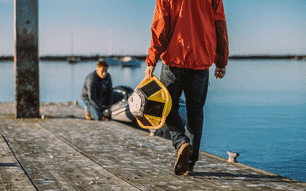Fishing has long formed part of the Belize culture, providing an important source of food and income for its many coastal communities.
Like many coastal nations, Belize’s fisheries have seen declines in fisheries from over exploitation and destructive fishing practices. Increasing coastal development, and climate change impacts on the ocean adds to the pressures on the low-tech, small-scale fisheries that dominate Belize’s coastal communities. Income diversification is increasingly becoming a necessity.
Working with Belize’s Placencia Fishermen Cooperative, Ms Robinson and colleagues at The Nature Conservancy developed and tested pilot mariculture farms. Working with the local community has been a central feature in the development of the mariculture project, which focuses on the red seaweed Euchemia isiforme.
Ms Robinson noted that many of Belize’s coastal communities are poverty stricken. It is by working with these communities, Ms Robinson urges, that they can become “great ocean stewards”, supporting not only their own livelihoods but contributing to healthy Belize waters that can also support other industries. The Placencia fishers have – and continue – to play a crucial role in the design of the farms, and experiments with new techniques.
Harvesting seaweed isn’t as far removed from fishing as it may at first appear. Traditionally Belize’s fishers have collected naturally growing seaweed whilst fishing species such as spiny lobster (Panulirus argus) and queen conch (Strombus gigas).
This seaweed, which is sold in local markets as food, acted as a supplement to fishers’ income, rather than the primary source of it. Whilst seaweed as a food item forms part of the mariculture business (including in the locally consumed ‘seaweed shakes’), the Placencia seaweed farmers are looking to expand their market with ‘value-added’ products, such as seaweed-based soaps, or seaweed-based thickeners for cooking.
Local demand for the seaweed and seaweed-based products is high – and still growing, though as Ms Robinson was keen to point out that, demand isn’t just restricted to the local market. Globally demand for seaweed is projected to increase at a rate of around 10 per cent per annum, offering the potential for significant economic growth for those wishing to farm seaweed. The challenge for the Placencia seaweed farmers is to scale-up its production to meet demand, and break in to the export market.
The Belize’s Placencia Fishermen Cooperative’s development of mariculture has also had a number of other benefits. Many of the seaweed farms provide work for women, helping to improve social equity in coastal communities.
The farms have also demonstrated a number of restorative functions including decreased nitrogen and phosphorous levels in waters around the farms. Locally-decreased levels of ocean acidification has been detected in the vicinity of these seaweed farms, though their potential for acidification mitigation is still unknown, and requires further investigation before any definitive conclusions can be reached.
For the spiny lobster and queen conch fisheries, these mariculture farms may also help restore declining stocks by providing habitat. Careful placement of these farms not only provides “stepping stones” allowing individuals to move between natural algal beds, but new habitat.
Increased post-larval settlement of spiny lobster has been detected, and adult settlement around these sites has been aided by the addition of artificial habitat.



